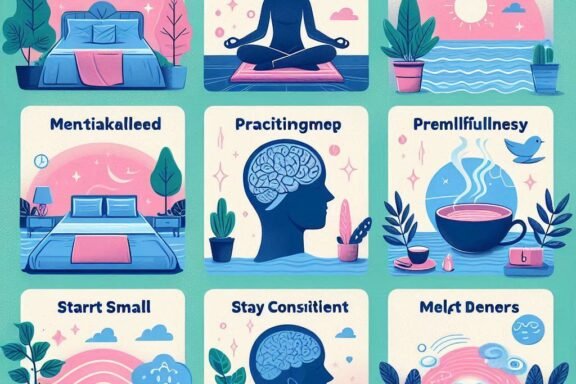Nourish Your Mind and Body: The Power of Healthy Foods, Lifestyle Choices, and Self-Care
In today’s fast-paced world, maintaining a balanced and healthy lifestyle is more important than ever. The pressures of work, family, and social obligations can sometimes leave little room for self-care, but it’s essential to prioritize your health—not only for your body but for your mind and soul as well. Self-care is a holistic concept that encompasses physical, emotional, and mental well-being, and it starts with the choices we make daily, especially when it comes to healthy foods and lifestyle habits.
Your well-being is influenced by much more than just the occasional workout or spa day. It’s about the routine choices you make each day—what you eat, how you move, how you manage stress, and how you rest. This blog explores how healthy foods, a mindful lifestyle, and consistent self-care practices can help you achieve optimal health and long-lasting happiness.
1. The Role of Healthy Foods in Self-Care: Fueling Your Body for Wellness
The food you eat is the fuel for your body. What you consume directly impacts how you feel, both physically and mentally. Eating a well-balanced diet with nutrient-dense foods not only supports physical health but also promotes emotional and mental well-being. By nourishing your body with the right foods, you can boost your energy levels, improve your mood, and even manage stress more effectively.
Key Nutrients for Mental and Physical Wellness:
- Omega-3 Fatty Acids: Found in fatty fish like salmon, walnuts, and chia seeds, omega-3s support brain health, reduce inflammation, and can help improve mood and reduce anxiety.
- B Vitamins: These are essential for proper brain function, including mood regulation. Foods rich in B vitamins, like leafy greens, whole grains, and eggs, help stabilize energy levels and reduce feelings of fatigue or irritability.
- Magnesium: This mineral is crucial for muscle relaxation, stress reduction, and promoting quality sleep. Magnesium-rich foods include leafy greens, avocados, nuts, and seeds.
- Vitamin D: Known as the “sunshine vitamin,” vitamin D plays a vital role in regulating mood and boosting immunity. It can be found in foods like fatty fish, fortified dairy, and egg yolks, but don’t forget to soak up some sunlight, too!
- Antioxidants: Foods like berries, dark chocolate, and colorful vegetables are packed with antioxidants that fight free radicals and inflammation, helping to reduce stress and promote overall health.
The foundation of any self-care routine begins with what you put into your body. Whole, unprocessed foods—such as fruits, vegetables, whole grains, lean proteins, and healthy fats—help regulate hormones, improve brain function, and provide steady energy throughout the day.
2. Healthy Lifestyle Habits for Lasting Well-Being
Living a healthy lifestyle is a key pillar of self-care. It’s not just about what you eat, but how you live. Your daily habits—such as how you manage stress, how much sleep you get, and how often you move your body—affect your physical and mental health. A balanced lifestyle that prioritizes movement, rest, and relaxation can help you maintain a sense of peace, focus, and energy.
Simple Lifestyle Practices for Better Health:
- Regular Exercise: Physical activity is essential for overall well-being. Not only does exercise improve physical health by boosting heart health and increasing strength, but it also releases endorphins—the body’s natural mood elevators. Whether it’s yoga, dancing, jogging, or strength training, moving your body helps reduce stress, anxiety, and improves your mood.
- Stress Management: Chronic stress can wreak havoc on both your body and mind. Incorporating stress-reducing practices into your daily routine is essential for a healthy lifestyle. Techniques like deep breathing exercises, progressive muscle relaxation, and mindfulness meditation can significantly lower your stress levels. Taking time to unwind and reflect helps keep you grounded and prevents burnout.
- Quality Sleep: Sleep is one of the most overlooked aspects of a healthy lifestyle. A good night’s sleep supports physical repair, cognitive function, and emotional regulation. Aim for 7–9 hours of sleep per night and develop a sleep-friendly environment by keeping your bedroom dark, quiet, and free of distractions. Establishing a calming bedtime routine can signal to your body that it’s time to rest and rejuvenate.
- Hydration: Staying hydrated is a vital part of maintaining energy levels and mental clarity. Water helps with digestion, temperature regulation, and nutrient absorption. Aim to drink at least eight glasses of water a day, and more if you’re physically active or living in a hot climate.
- Boundaries and Balance: In today’s digital age, it’s easy to feel constantly “on.” Setting boundaries around your work, social media use, and screen time is crucial for mental well-being. Take time for yourself—whether it’s through journaling, taking a walk, or simply disconnecting for a few hours each day.
These lifestyle practices help foster physical vitality and mental resilience, contributing to an overall sense of well-being and life satisfaction.
3. The Power of Self-Care: Taking Time to Nourish Your Soul
Self-care is more than just treating yourself to a bubble bath or indulging in a piece of chocolate (though those can be fun too!). True self-care is about consistently taking time for yourself to nurture your mind, body, and soul. This includes making choices that prioritize your mental health, emotional well-being, and physical vitality.
Self-care can be broken down into several areas that feed into each other. By incorporating mindful practices that nurture your whole self, you create a balanced, sustainable routine for long-term health and happiness.
Self-Care Practices to Add to Your Routine:
- Mindfulness and Meditation: Taking a few moments each day to practice mindfulness or meditation can help reduce stress, improve focus, and increase emotional clarity. Even 5–10 minutes of quiet reflection can reset your mental state and help you approach life with a sense of calm.
- Time for Hobbies: Make sure to carve out time for activities that bring you joy, whether it’s reading, painting, gardening, or cooking. Engaging in hobbies boosts creativity, reduces stress, and promotes a sense of accomplishment.
- Social Connections: Healthy relationships are a key part of self-care. Spending time with friends, family, or loved ones boosts your mood, provides emotional support, and fosters a sense of belonging. Nurture the connections that matter most to you and don’t hesitate to set aside time for socializing.
- Journaling: Journaling is a therapeutic way to process your thoughts, emotions, and experiences. Whether you’re writing down your goals, reflecting on your day, or exploring your feelings, journaling allows you to organize your thoughts and gain perspective on challenges you may face.
- Physical Touch: Human touch is incredibly powerful for emotional well-being. Consider giving yourself or receiving massages, taking a warm bath, or cuddling with a loved one. Physical touch has been shown to release oxytocin, the bonding hormone that helps reduce stress and promote relaxation.
By carving out time for self-care activities that nourish your soul, you create a more balanced and fulfilling life, one that is not dependent solely on work, obligations, or external validation.
4. Creating a Personalized Self-Care Routine: Integrating Food, Lifestyle, and Rest
Building a self-care routine that aligns with your lifestyle and personal needs is key to long-term success. It’s about finding the right balance between nutrition, physical activity, stress management, and rest. Incorporating these elements into your daily life can help you create a routine that supports your mental, physical, and emotional well-being.
Steps to Create Your Personalized Routine:
- Start Small: Begin by incorporating one or two new habits at a time. This could be as simple as adding a daily walk to your routine or making sure you drink enough water throughout the day.
- Create Consistency: It’s easier to maintain healthy habits when they become part of your daily routine. Set a schedule that works for you, whether that’s setting aside time for meditation in the morning or cooking a nourishing dinner each night.
- Set Realistic Goals: Self-care isn’t about perfection—it’s about progress. Set achievable goals for your health and wellness journey, whether it’s improving your diet, getting more sleep, or reducing stress.
- Listen to Your Body: Pay attention to your body’s signals. If you’re feeling fatigued or stressed, take time to rest. If you’re feeling anxious or overwhelmed, use relaxation techniques to calm your mind. Self-care is about tuning in to what your body needs at any given moment.
- Celebrate Your Progress: Take time to acknowledge and celebrate the positive changes you’re making. Whether it’s a small milestone, like getting a good night’s sleep, or a bigger achievement, like adopting a new workout routine, celebrate your progress as you move forward on your wellness journey.
By integrating healthy foods, mindful lifestyle choices, and intentional self-care practices, you create a balanced approach to health and well-being that supports a vibrant, energized, and happy life.
Conclusion: A Holistic Approach to Health and Well-Being
The journey to better health and wellness is a personal one, but it’s rooted in making intentional, healthy choices. Nourishing your body with the right foods, embracing a balanced lifestyle, and committing to a self-care routine can significantly improve your physical health, mental clarity, and emotional resilience. Self-care is not a luxury; it’s a necessity. When you make self-care a priority in your life, you invest in your long-term happiness, vitality, and overall well-being.
By taking small steps every day—through nourishing foods, mindful habits, and dedicated self-care—you can create a life filled with health, joy, and inner peace.







No Comments